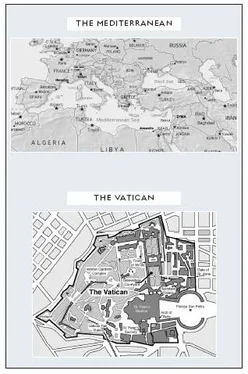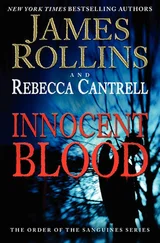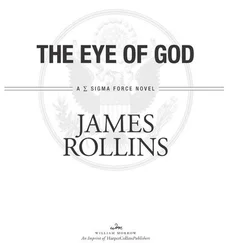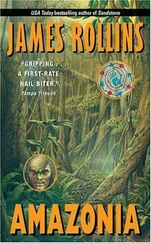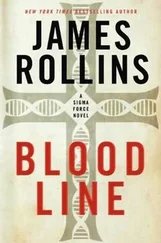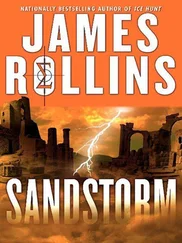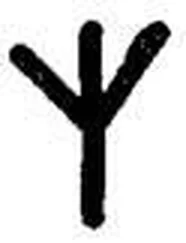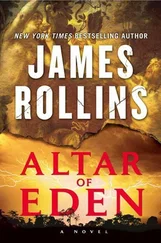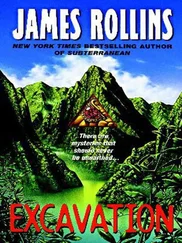Dragged out, she heard a cacophony of growling and barking, loud, angry, large. A kennel of some sort.
She was led by the elbow through an opening and down steps. A door closed behind her, shutting off the barking. She smelled cold stone and dampness. She had also felt the pressure elevation as the truck drove up here.
Mountains.
Finally she was shoved forward and tripped over a sill. She landed hard on hands and knees.
Raoul grabbed her rear with both hands and laughed. “Already begging for it.”
Rachel leapt away and crashed her shoulder into something solid. Her soggy gag and hood were pulled off. Rubbing her shoulder, she stared around the small stone cell. Again no windows. Her sense of time was beginning to slip. The only furniture in the cell was a steel cot. A thin mattress rolled up on one end. A pillow rested on top. No sheets.
The cell had no bars. One wall was a solid sheet of glass, except for a rubber-sealed door and fist-sized ventilation holes. But even the holes had tiny lids that could be swung over the openings, for soundproofing or a way to slowly suffocate the prisoner.
She had been left down here for over an hour.
Not even any guards. Though she did hear voices down the hall, probably posted at the stairwell.
A commotion sounded. She lifted her face and stood. She heard Raoul’s coarse voice, orders barked. She backed from the glass wall. Her clothes had been returned to her on the boat, but she had no weapons.
Raoul appeared, flanked by two men.
He did not look happy.
“Get her out of there,” he spat.
A key opened the door. She was dragged out.
“This way,” Raoul said. He led her down the hallway.
She spotted other cells, some sealed like hers, others open and stacked with wine bottles.
Raoul marched her to the stairs and up to a dark moonlit courtyard. Stone walls towered on all sides. An archway, sealed by a portcullis, led out to a narrow bridge that spanned a gorge.
She was in a castle.
A row of trucks lined the wall nearest the gateway.
Along a neighboring wall, a long row of twenty chain-link cages stretched. Low grumbles rose from that corner. Large shadows shifted, muscular, powerful.
Raoul must have noted her attention. “Perro de Presa Canario,” he said with a note of savage pride. “Fighting dogs, an ancestral line from the 1800s. Perfection of breeding. Pure pit fighter. All muscle, jaws, and teeth.”
Rachel wondered if he was also describing himself.
Raoul led her away from the gate and toward the central keep. Two tiers of stairs led up to a thick oak door. It was brightly lit by sconces, almost inviting. But they didn’t go that way. A side door led to a level beneath the stairs.
Using a touchpad, he unlocked the lower door.
As the door swung open, Rachel caught a whiff of antiseptic and something darker, more fetid. She was forced into a square room, brightly lit with fluorescent bulbs. Stone walls, linoleum floor. A single guard stood before the one door that led away.
Raoul crossed and opened it.
Beyond stretched a long, sterile hallway. A series of rooms opened off it. She glanced into a few as she was marched down the passage. Stainless-steel cages filled one. Banks of computers tied to rows of plates occupied another. Electromagnets, she guessed, used to experiment with the m-state compounds. A third chamber held a single steel table, shaped in a rough X. Leather straps indicated that the table was meant to hold a man or woman spread-eagled. A surgical lamp hung above it.
The sight chilled her to the bone.
Another six rooms stretched beyond. She had seen enough and was happy to stop alongside a door on the opposite wall.
Raoul knocked and pushed inside.
Rachel was surprised by the contrast. It was like stepping into the turn-of-the-century parlor of a distinguished Royal Society scholar. The room here was all polished mahogany and walnut. Underfoot spread a thick Turkish rug patterned in crimson and emerald.
Bookshelves and display cabinets lined all the walls, filled with neatly arranged texts. Behind glass, she noted first-edition copies of Principia by Sir Isaac Newton, and beside it, Darwin’s Origin of Species . There was also an illuminated Egyptian manuscript spread open in one case. Rachel wondered if it was the one that had been stolen from the Cairo museum, the forged text with the encrypted stanzas that had started this whole murderous adventure.
Everywhere she looked there was artwork. Etruscan and Roman statuary decorated the shelves, including a two-foot-tall Persian horse, the head broken off, a masterpiece stolen from Iran a decade ago, supposedly representing Alexander the Great’s famous horse, Bucephalus. Paintings stood above cabinets. She knew one was a Rembrandt, another a Raphael.
But resting in the center of the room was a massive carved mahogany desk. It rested near a stacked-stone, floor-to-ceiling fireplace. Small flames flickered in the hearth.
“ Professore !” Raoul called, closing the door behind them.
Through a back door leading to other private rooms, Dr. Alberto Menardi entered. He wore a black smoking jacket trimmed in crimson. He had the gall to be still wearing his clerical Roman collar above a black shirt.
He carried a book under one arm and shook a finger at Rachel. “You haven’t been totally honest with us.”
Rachel felt her heart stop beating, her breath became trapped.
Alberto turned to Raoul. “And if you hadn’t distracted me with the need to mend that American’s wrist, I would’ve discovered this sooner. Both of you, come here.”
They were waved to the cluttered desk.
Rachel noted her map of the Mediterranean spread out on the top. New lines had been added, circles, meridians, degree marks. Tiny arcane numbers were inscribed along one edge of the map. A compass and T square rested beside it, along with a sextant. Plainly, Alberto had been working on this puzzle, either not trusting Rachel or figuring she and her uncle were too obtuse.
The prefect tapped the map. “Rome is not the next place.”
Rachel forced herself not to flinch.
Alberto continued, “All the subtext to this geometric design signifies forward motion in time. Even this hourglass, it segments time, marching forward one grain at a time, to the inevitable end. For this reason, the symbol of the hourglass has always represented death, the end of time. To have an hourglass show up here can only mean one thing.”
Raoul’s frown deepened, indicating his lack of understanding.
Alberto sighed. “Obviously, it signifies the end of this journey. I’m sure that wherever this clue points, it marks the last stop.”
Rachel felt Raoul stir beside her. They were close to their end goal. But they didn’t have the gold key, and for all Alberto’s intelligence, he hadn’t solved the complete riddle yet. But he would.
“It can’t be Rome,” Alberto said. “That’s moving backward, not forward. There is another mystery to solve here.”
Rachel shook her head, feigning exhausted disinterest. “That’s all we could calculate before we were attacked.” She waved around his room. “We didn’t have your resources.”
Alberto studied her as she spoke. She stared, unflinching.
“I…I believe you,” he said slowly. “Monsignor Vigor is quite sharp, but this riddle is layered in mystery.”
Rachel kept her features dull, allowing some fear to show, acting cowed. Alberto worked alone. He’d plainly ensconced himself in here to solve the Court’s mysteries. Trusting no one else, conceited in his own superiority. He would not understand the value of the wider perspective, a diversification of viewpoint. It had taken the entire team’s expertise to piece the mystery together, not the work of one man.
Читать дальше
